Table Of Contents
One decision that veterans often have to make as they take their cases to the Board of Veterans’ Appeals (the second level of the VA administrative review process, after the regional office has denied the claim), is whether to have a hearing before a Board judge. All veterans who appeal their cases to the Board will have the opportunity to present their cases, either in person or by video conference, to the VA judge.
So is a BVA hearing right in your case? Well, there are many, many factors that you must consider. The first factor is whether you think you will be comfortable getting through a hearing. Presenting a case before a judge can be a nerve-wracking experience. This is true even though the hearings are informal, at least compared to other legal hearings. Moreover, many veterans (particularly those who are suffering from PTSD) do not want to have to talk about their traumatic experiences. For these veterans, it is difficult enough having to go talk to a doctor about these experiences, and the thought of having to talk to a judge can be overwhelming. Also, some people just don’t like speaking in public.
What Factors Should I Consider?
Ok, so let us assume that you have a hearing scheduled, and you are comfortable talking about your disability. What other factors should you consider? The biggest factor, in my opinion, is whether your personal testimony can actually help you win your case. Say you are trying to win a PTSD claim, but VA is denying the case because doctors have not said you have PTSD. In this situation, your personal testimony is generally not going to help you win your case, because you need a doctor to say you actually have PTSD. In other words, you need a diagnosis, and diagnoses generally must be made by doctors.
On the other hand, if you already are service connected for PTSD, and you’re trying to get a higher rating than the regional office assigned, a hearing could be very helpful. This is because your personal testimony can help to establish your symptoms–depression, nightmares, problems getting along with people, and so forth. You could even bring in family and friends to testify to your symptoms! In cases where you are simply trying to establish the presence of symptoms, hearings can be very helpful. Likewise, if you are trying to prove that you suffered an injury in service, your testimony could help to establish what actually happened in service. Hearings can help when you are simply trying to establish things that you have witnessed, or symptoms you are having.
Of course, I’m oversimplifying a bit, and there are other situations where hearings can be helpful to your case. But the point is that hearings are useful sometimes, and sometimes they are not.
Other Benefits and Drawbacks to VA Hearings
There are, of course other benefits to having hearings. Having spoken to some people who work at the Board, I get the sense that actually seeing the veteran makes the case a bit more personal. And there are other drawbacks to hearings. Having worked at the U.S. Court of Appeals for Veterans Claims (the body that reviews the Board’s decisions for errors), I have seen too many cases where veterans have provided testimony that harmed their cases. It’s a two-way street at hearings–you can give testimony helpful to your case just like you can give testimony that hurts your case.
I will add that, in almost all cases where I have a hearing, I will do a written argument (a “brief”) to supplement the hearing testimony. That way, I can set out my legal arguments in the most organized manner possible (with citations to legal authorities, which is critical in many cases), and we get the benefits of a hearing as well.
Do I Need an Advocate at a VA Hearing?
An advocate experienced in veterans’ disability claims and appeals can help you determine 1) whether a hearing before a VA judge might be helpful in your case, and 2) what evidence to present—and how to present it—in connection with such a hearing. If you are unsure how to proceed, or need assistance with an appeal, we welcome you to contact Veterans Help Group for a free consultation.

Veterans Help Group Serving Our Community
Veterans Help Group Serving Our Community By Bobbi Boudi, Director of Community Outreach & Amy...

How Much Back Pay Will You Receive?
What is VA Disability Back Pay? VA disability back pay is payment for benefits the veteran was...

Your Guide to VA Ratings: Sleep Apnea
Your Guide to VA Ratings: Sleep Apnea Sleep apnea can be a serious condition that may impact...





